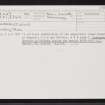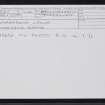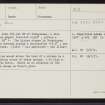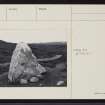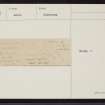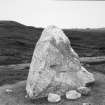Lewis, Garrabost
Standing Stone (Prehistoric)
Site Name Lewis, Garrabost
Classification Standing Stone (Prehistoric)
Alternative Name(s) Dursainean, Clach Ghlas
Canmore ID 4398
Site Number NB53SW 7
NGR NB 5281 3340
Datum OSGB36 - NGR
Permalink http://canmore.org.uk/site/4398
- Council Western Isles
- Parish Stornoway
- Former Region Western Isles Islands Area
- Former District Western Isles
- Former County Ross And Cromarty
NB53SW 7 5281 3340
NB 5281 3340 - Some 600 yards NE of Dursainean, a slab stands on a long mound, oriented c. 304 , giving a declination of 16 +/-. The higher stones in Dursainean are just visible on the horizon giving a declination - 19.3 , one of the lunar lines. (Cist? - not mentioned)
A Thom 1967.
Situated on a low mound above the bank of a stream is a triangular standing stone of Lewis gneiss, 1.7m high x 18.m wide x 0.5m thick. There is no evidence of the other structure shown on Thom's plan.
Visited by OS (R D), 16 July 1971.
NB 528 334 Local volunteers surveyed a cairn surmounted by a standing stone by plane table in February to March 2006, with the permission of Historic Scotland. The project was designed to develop the participants' practical skills, and to gather information about a little-understood Scheduled Ancient Monument for public interpretation. The thick heather covering was first cleared to expose the full extent and nature of the mound. The monument was shown to consist of a 30m long stony mound WNW-ESE aligned, up to 2m high, the upper part of which is artificial. A triangular-shaped stone of local gneiss is set 1.7m high in the centre of the mound towards its SW edge to one side of a rectangular stone-lined depression c 1.9 x 3.25m and up to 0.5m deep. A small circular hollow is visible at the NW end of the mound. Around the northern half of the cairn is a wet ditch, but it is not clear whether it was man-made as part of the construction of the monument, or formed naturally around an obstacle to drainage. Clach Ghlas lies within 600m of Cnoc nan Duirsainean, a Neolithic chambered cairn, and is itself likely to be represent a prehistoric burial mound.
Report lodged with Western Isles SMR and Historic Scotland.
Carol Knott, 2006.
Measured Survey (February 2006 - March 2006)
NB 528 334 Local volunteers surveyed a cairn surmounted by a standing stone by plane table in February to March 2006, with the permission of Historic Scotland. The project was designed to develop the participants' practical skills, and to gather information about a little-understood Scheduled Ancient Monument for public interpretation. The thick heather covering was first cleared to expose the full extent and nature of the mound. The monument was shown to consist of a 30m long stony mound WNW-ESE aligned, up to 2m high, the upper part of which is artificial. A triangular-shaped stone of local gneiss is set 1.7m high in the centre of the mound towards its SW edge to one side of a rectangular stone-lined depression c 1.9 x 3.25m and up to 0.5m deep. A small circular hollow is visible at the NW end of the mound. Around the northern half of the cairn is a wet ditch, but it is not clear whether it was man-made as part of the construction of the monument, or formed naturally around an obstacle to drainage. Clach Ghlas lies within 600m of Cnoc nan Duirsainean, a Neolithic chambered cairn, and is itself likely to be represent a prehistoric burial mound.
Report lodged with Western Isles SMR and Historic Scotland.
C Knott 2006












